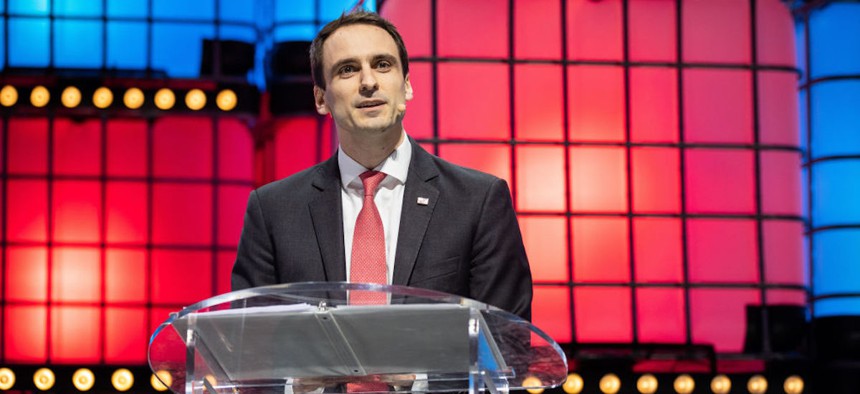OSTP director nominee promises to center ‘American leadership’ in emerging tech work

Former U.S Chief Technology Officer Michael Kratsios speaking during the annual Web Summit technology conference in 2019. Kratsios has been nominated by President Donald Trump to head OSTP. Henrique Casinhas/SOPA Images/LightRocket via Getty Images
Trump’s pick to lead the Office of Science and Technology Policy, Michael Kratsios, identified innovating in AI and quantum as two of his major priorities.
President Trump's pick for director of the White House Office of Science and Technology Policy Michael Kratsios will prioritize emerging technologies should he be confirmed, he said in testimony during his Tuesday confirmation hearing.
Lawmakers sitting on the Senate Commerce, Science and Transportation Committee asked Kratsios a litany of questions surrounding what his leadership would look like as OSTP director, focusing on how he would advance quantum information sciences, artificial intelligence and biotechnologies.
“I am committed to American leadership in emerging technologies, and to ensuring that all Americans benefit from scientific and technological advances,” Kratsios said in his opening statement.
He later commented that four pillars characterize his ideal emerging tech national strategy: research and development, regulations, international collaboration and workforce –– all to maintain America’s competitive edge in AI development.
“Within the federal government, there's lots of levers that you can use to drive those efforts. It can be through grants and fellowships to researchers, and it can also be through lots of other programs to allow for training and reskilling,” Kratsios said.
When it comes to the Trump administration’s pending national AI strategy, Kratsios also said he wants to tailor AI use cases to agency needs.
“To me, when you think about applying an AI strategy across the agencies, is to think very carefully and critically about what the individual missions of the various agencies are, and align the policy actions associated with the strategy,” he said. This includes supporting collaboration between the public, private and academic sectors as a means to further commercial applications of emerging tech in both AI and quantum.
“I think both in the world of AI and in quantum we've seen examples where AI centers, both from [the National Science Foundation] and [Department of Energy], have shown the opportunity where the private sector can come in and work with academia and government together to do the important basic R&D, and then ultimately be able to translate that into use cases for the commercial sector,” Kratsios said. “So I think we need to continue to look at those opportunities and do more of that.”
Kratsios also reiterated his support for the passage of the National Quantum Initiative Reauthorization Act.
“I think, for me, we have an incredible opportunity before us, and in this Congress, to reauthorize the National Quantum Initiative,” he said. “I think there's important work to be done on the way that sort of a lot of the very great and vital basic research that's done on quantum is ultimately translated into things that can actually benefit the American people through use cases.”
He went on to say he supports a “whole of government” approach that leverages the strengths of individual agencies to further U.S. scientific and tech advancement. Kratsios notably said that the test beds in federally-funded centers can support innovation and eventual commercialization of emerging tech systems.
“I look forward to working with a wide variety of agencies that would be involved in driving this AI action plan,” he said. “But most critically –– and I think through the lens that I would be looking through all this –– understanding what the strengths are in individual agencies, and making sure that how they contribute to the larger strategy aligns with that, rather than deviating from it.”
President Donald Trump nominated Michael Kratsios for the OSTP director position via TruthSocial following his 2024 presidential election victory. Kratsios previously served as the U.S. chief technology officer during Trump’s first administration.
His nomination comes as the Trump administration has moved to terminate thousands of federal employees in a bid to cut federal spending on its workforce. In response to a question about how he would secure a strong, technologically-savvy federal workforce, Kratsios said that he will “bring to bear the importance of science and technological advice” across federal agencies.






